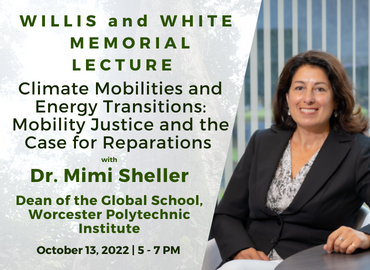Climate Mobilities and Energy Transitions: Mobility Justice and the Case for Reparations
When and Where
Speakers
Description
Mobility justice offers a way to understand the relationship between the high consumption of fossil fuel in the Global North that is driving greenhouse gas (GHG) levels up and the uneven impacts that are driving climate displacement, especially in the Global South, through various kinds of “climate mobilities”. This talk will argue first that climate-driven displacement is deeply related to mobility injustices. Second, that energy transitions that are premised on renewable energy are further driving “climate colonialism” insofar as extractive industries continue to sacrifice Indigenous land, water and people for the sake of the “global” energy transition. And third, that this leads to a strong case for climate reparations in order to preserve mobile commons and recognize Indigenous “transmotion” (Simpson 2011) by “unsettling mobility” (Lelievre 2017). Countries that have been the largest emitters of GHG cannot simply replace fossil fuel extraction with “green” energy and “sustainable” industry. Deeper transformations must be grounded in principles of mobility justice that challenge the dominant (neo)colonial mobility regimes that created the current environmental crisis.
About the Speaker:
Mimi Sheller, Ph.D., is Inaugural Dean of The Global School at Worcester Polytechnic Institute, in Massachusetts. Until July 2021 she was Professor of Sociology, Head of the Sociology Department, and founding Director of the Center for Mobilities Research and Policy at Drexel University in Philadelphia. She served as President of the International Association for the History of Transport, Traffic and Mobility (2014-2017), founding co-editor of the journal Mobilities, Associate Editor of Transfers: International Journal of Mobility Studies. She helped to establish the “new mobilities paradigm” and is considered to be a key theorist in critical mobilities research and in Caribbean studies.
Dr. Sheller has published more than 130 articles and book chapters, and is the author or co-editor of fifteen books, including Advanced Introduction to Mobilities (Edward Elgar, 2021); Island Futures: Caribbean Survival in the Anthropocene (Duke University Press, 2020); Mobility Justice: The Politics of Movement in an Age of Extremes (Verso, 2018); Aluminum Dreams: The Making of Light Modernity (MIT Press, 2014); Citizenship from Below (Duke University Press, 2012); Consuming the Caribbean (Routledge, 2003); and Democracy After Slavery (Macmillan Caribbean, 2000).
She was awarded the Doctor Honoris Causa from Roskilde University, Denmark (2015). She has received research funding from the National Science Foundation, the British Academy, the Arts and Humanities Research Council, the Macarthur Foundation, the Mobile Lives Forum, and the Graham Foundation in Advanced Studies in the Fine Arts. She has held Visiting Fellowships at the University of Miami (2019); the Annenberg School of Communication at University of Pennsylvania (2016); the Penn Humanities Forum (2010); the Center for Mobility and Urban Studies at Aalborg University, Denmark (2009); Media@McGill, Canada (2009); the Davis Center for Historical Studies at Princeton University (2008).



